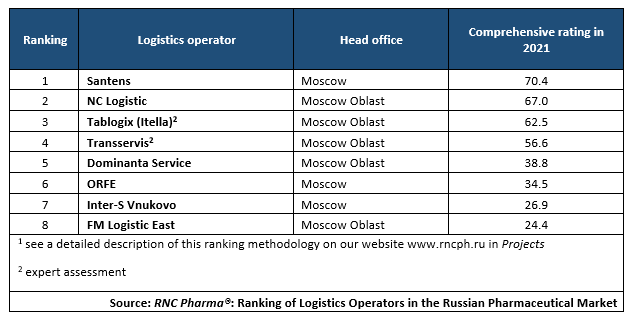2021 Ranking of Logistics Operators in the Russian Pharmaceutical Market
Global changes in the logistics system followed Russia’s special military operation in Ukraine, becoming one of the main topics in recent months. These changes made it impossible for certain transport corridors to function, as well as increased the risks of imports failing to pass through the territories of certain countries, in particular Poland. Finally, air traffic bans were a result of political pressure in the form of sanctions, suspending the reservation of certain container lines intended for imports to Russia. Obviously, this led to changing both the import routes themselves and the terms of additional insurance, prepayment requirements, etc. In one word, logistics became significantly more expensive than in the pre-crisis period.
A year earlier, COVID-19 set the direction of the pharmaceutical market, and the manufacture of new “covid-specific” drugs had the main impact on the development of the industry. Given the scale of the problem, the demand for those drugs was very significant, but it was the vaccines that created a really serious challenge for all the market participants, especially for the logistics system. The demand for the coronavirus vaccine was many times higher than the standard demand for any other vaccine, with the specifics of Russia’s main vaccine, Gam-COVID-Vac by the Gamaleya Research Institute of Epidemiology and Microbiology, setting up another serious challenge. The vaccine required special storage conditions, at a temperature not higher than –18⁰С.
While there are also health products that require similar storage and transportation conditions—for example, frozen plasma and cryoprecipitate must be stored at a temperature not higher than –30⁰С and –25⁰С, respectively; certain biological samples also require similar conditions—far from all healthcare organizations work with such products. In the case of a large-scale vaccination campaign against COVID-19, it was simply impossible to rely only on healthcare institutions from a technical standpoint.
What is important here is that a rather limited number of logistics operators can operate with drugs that require a temperature regime of no higher than –18⁰С. Among the top logistics operators, only two companies—NC Logistic and Transservis—can meet those requirements. In general, the vast majority of operators prefer to work at best with three temperature regimes: 2–8°C, 8–15°C, and 15–25°C, with the latter accounting for the most of storage capacity, which is determined by the specifics of drugs on the Russian pharmaceutical market.
Of course, the issues with supplying drugs for the treatment and prevention of COVID-19 were not the only problems of the Russian pharmaceutical market and logistics companies. For example, a major deal took place in the logistics services market in late 2021, when the Tablogix logistics company acquired Finnish Itella, which used to actively work with the pharmaceutical market. The buyer received not only new storage facilities and infrastructure, but also a number of new competencies, which implies a serious diversification of the business. Earlier, the company was mainly known as a supplier of spare parts and automotive components, but the new deal automatically made it one of the leading logistics operators in the Russian pharmaceutical market.
Tab. Comprehensive ranking1 of logistics operators in the Russian pharmaceutical market in 2021

 Рус
Рус




